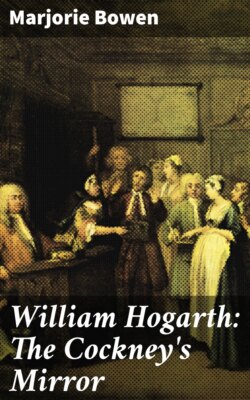Читать книгу William Hogarth: The Cockney's Mirror - Bowen Marjorie - Страница 5
На сайте Литреса книга снята с продажи.
* * *
ОглавлениеTable of Contents
To the middle of the eighteenth century all the great changes lay ahead; the commercial inventions that gave the country her sudden supremacy in European trade were as yet undreamt of; James Brindley had not cut his canals, or MacAdam laid down his roads; the mineral wealth of the country was unexploited, even two-thirds of all iron used was imported; charcoal was still used for smelting, the manufactured goods were made by hand in cottage homes, the high cost of transport—Manchester to Liverpool, forty shillings a ton for goods—kept enterprise and industry at a standstill; the use of water power covered the country with water-mills; the post was expensive and uncertain, it was a Government Service, remodelled in 1710; the charge was 3d. up to 80 miles, to Edinburgh or Dublin 6d.; the mail left the capital three times a week.
Large tracts of England, Wales and Scotland were wild, bleak, uncultivated, sparsely inhabited, difficult and dangerous to cross; a Cockney would have been as utterly lost on Yorkshire moors, Welsh hills or Scottish valleys as if he had been in Siberia or Tibet; such centres as the provincial gentry made for themselves, Chester, York, and Shrewsbury, were isolated from one another and from London; the country towns were self-supporting.
There was much unemployment, resulting in hordes of beggars; this evil arose from the gradual enclosure of the common lands by the landowners, who held all parliamentary power, from the conversion of arable land into pasturage for sheep, to supply the lucrative wool trade, and from the seizure of the Guild funds by Edward VI. Voteless, despoiled and plundered, the peasant's only hope was in the clumsy Poor Laws of Elizabeth and Charles II, which fed the destitute workers in sickness, old age or unemployment, on condition that their wages were fixed by the magistrates; as these were also their employers, the English labourer was in reality a slave, with no rights, freedom or privileges—a slave over whom there was no one to agitate or to sentimentalize.
